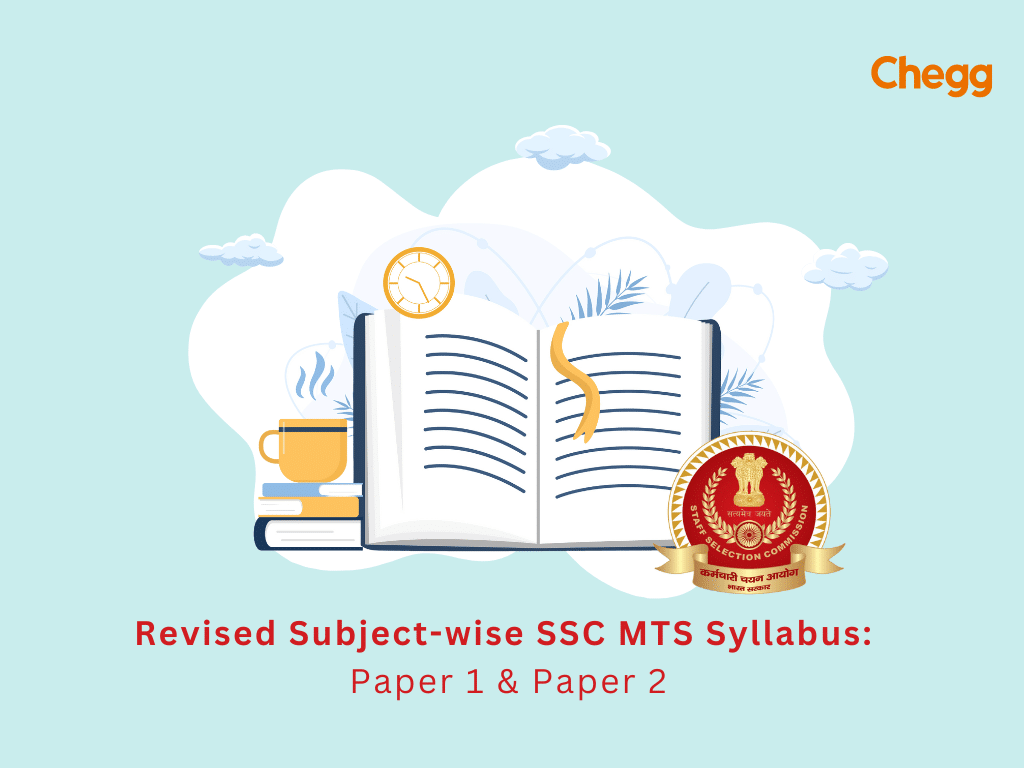SSC MTS Syllabus 2024: Paper 1 & Paper 2 Subject Wise

Table of Contents
Table of Contents
The SSC full form means the Staff Selection Commission conducts an annual national-level exam called the SSC MTS exam 2024 to find qualified candidates for the position of Multitasking Staff in various ministries, offices, and departments of the central government. To appear for the SSC MTS recruitment, one must have a thorough knowledge of the SSC MTS syllabus 2024.
The staff selection commission determines SSC MTS eligibility criteria based on age, nationality, and educational level. In this article, we will focus on the SSC MTS syllabus and the nature of the exam.

SSC MTS Syllabus: Paper 1 and Paper 2
It is important to go through the SSC MTS exam syllabus to comprehend the subjects that will be covered in the test. The SSC MTS exam pattern consists of two papers: SSC MTS Paper-I and SSC Paper II Mts.
The SSC MTS syllabus Paper-I includes General Intelligence and Reasoning, Numerical Aptitude, General English, and General Awareness. The syllabus for SSC MTS Paper II includes a Short Essay/Letter in English or any language included in the 8th schedule of the Constitution.
According to the SSC MTS exam syllabus, the SSC MTS Paper 2 pattern is a descriptive test that consists of a short essay or letter in English or any language included in the 8th Schedule of the Constitution.
SSC MTS General Intelligence & Reasoning Syllabus:
This section’s objective is to evaluate a candidate’s capacity for logical reasoning. Questions on verbal and nonverbal thinking are included in this section. So, intelligence, decision-making, analogies, and series are all heavily emphasized.
The list of topics for SSC MTS Syllabus General Knowledge & Reasoning includes:
- Coding-Decoding
- Analogy
- Number & Alphabetical Series
- Odd one Out
- Ranking
- Blood relations
- Syllogism
- Directions Sense
- Matrix
- Non-verbal: Paper folding and cutting, mirror image, embedded or complete image, and counting figures are all included.
- Mathematical Calculations
SSC MTS 2024: Numerical Aptitude
The SSC MTS exam syllabus includes the numerical aptitude section. Any candidate with a basic understanding of maths can be comfortable attempting this section. You must have a basic understanding of concepts such as HCF, LCM, and decimal and fraction conversions. Practice solving numerical value simplification and approximation problems.
The subjects of the SSC MTS exam 2024 maths syllabus are:
- Profit & Loss
- Ratio, Mixture & Alligation
- Mensuration
- Percentage, Average
- Time & Work
- Number System/HCF/LCM
- Trigonometry
- DI
- Algebra
- Time Speed Distance
- CI & SI
- Geometry

SSC MTS English Syllabus
The SSC MTS English syllabus tests the candidates’ comprehension of the language’s basics, including vocabulary, grammar, sentence structure, synonyms, antonyms, and proper usage, among other things. Their ability to write would also be evaluated.
- The list of topics in this section includes:
- Jumbled sentences
- One-word substitution
- Fill in the Blanks
- Idioms & Phrases
- Synonyms & Antonyms
- Common errors
- Sentence improvement
- Spellings/Detecting Mis-spelt words
- Passage
SSC MTS Recruitment 2024: General Awareness Syllabus
The syllabus for SSC MTS general awareness includes questions related to:
- Sports
- History
- Culture
- Geography
- The economic scene
- General politics including the Indian Constitution
- Scientific research
Additionally, questions will be designed to assess knowledge of current events as well as everyday observations and experiences in different aspects.
Also read: SSC MTS Exam Pattern 2024 & Marking Scheme: Paper 1 & 2
SSC MTS Exam 2024: Effective Preparation Strategy
Based on the SSC MTS exam syllabus, students will be able to identify the pattern of the exam among other things. Paper I is conducted in two sessions and there are specific guidelines that one must know before attempting the exam.
They are as follows:
- Candidates will be disqualified if they do not attempt both sessions.
- There are forty questions on numerical reasoning and ability in session one.
- 50 questions on English and general knowledge are included in session 2.
- Each question will be worth three points.
- In session 2, one mark will be deducted for each incorrect response, but there will be no negative marking in session 1.
More Tips for SSC MTS Recruitment
For better preparation, students must plan out in a way that they can cover the entire syllabus thoroughly.
- It is essential to have a thorough understanding of the exam pattern and syllabus before beginning your preparation. You will be able to plan your study schedule and determine which subjects to focus on with this information.
- One of the best ways to get ready for the exam is to solve question papers from previous years. It will help you identify your strengths and weaknesses and give you an idea of the kinds of questions that will be asked on the exam.
- Another effective way to prepare for the SSC MTS exam is to take online practice tests. It will assist you with understanding the test design and developing time management.
- Concentrate on establishing a solid foundation in each subject’s basic ideas.
- Being aware of current affairs will help in the general awareness section which requires a lot of knowledge from day-to-day situations.
- Finally, stay motivated throughout your preparation. Believe in yourself and your abilities, and stay positive. A positive attitude can go a long way in achieving your goals.
SSC MTS Books Recommendation
General Intelligence & Reasoning:
- “A Modern Approach to Verbal & Non-Verbal Reasoning” by R.S. Aggarwal
- “Analytical Reasoning” by M.K. Pandey
General Awareness:
- “Lucent’s General Knowledge” by Dr. Binay Karna
- “Manorama Yearbook”
Quantitative Aptitude:
- “Quantitative Aptitude for Competitive Examinations” by R.S. Aggarwal
- “Arithmetic for Competitive Examinations” by Neetu Singh
English Language:
- “Objective General English” by S.P. Bakshi
- “Word Power Made Easy” by Norman Lewis
General Study Materials:
- “SSC MTS Exam Guide” by Disha Experts
- “SSC MTS (Non-Technical) Guide” by Arihant Experts
Previous Year Papers:
- Solved previous year papers from various publications like Arihant, Disha, or Kiran Prakashan
Benefits of SSC MTS Syllabus
- Comprehensive coverage: The syllabus covers a wide range of topics, ensuring a well-rounded understanding.
- Basic level: The difficulty level is normally low, making it accessible to individuals with diverse educational backgrounds.
- Practical knowledge: Many themes are applicable to daily life and broad awareness.
- Preparing for the exam strengthens thinking, analytical, and problem-solving abilities.
- Future career development: The knowledge learned can be applied to future competitive exams and job promotion.
You can also find the updated information and details on the official website
Recommended reading:
SSC CGL Exam – Combined Graduate Level Examination
SSC CHSL Exam – Combined Higher Secondary Level Examination
SSC GD Exam – General Duty Level Examination
SSC JHT Exam – Junior Hindi Translator Exam
Frequently Asked Questions (FAQs)
What is the SSC MTS salary?
The basic pay for SSC MTS is Rs. 18,000, with a starting salary of Rs. 18,00 0 to Rs. 22,000, monthly.
What is the SSC MTS job syllabus?
The SSC MTS exam syllabus for being considered for jobs consists of four sections. This includes Reasoning Ability, Numerical Aptitude, English Language, and General Awareness.
Is MTS Paper 2 qualifying?
Paper 2 is a qualifying paper that only tests a candidate’s basic skills. There will be a maximum score of 50 for it.
Does SSC MTS have a negative marking?
Paper I is divided into two sessions. In session 2, each incorrect response will receive one point of negative marking, whereas, in session 1, there will be no negative marking.